Strom Thurmond
 From Nwe
From Nwe
James Strom Thurmond (December 5, 1902 – June 26, 2003) was an American politician who served as governor of South Carolina and as a United States Senator. He also ran for the U.S. President in the United States presidential election of 1948 under the segregationist States Rights Democratic Party banner. He garnered 39 electoral votes in that race, making him the first third party presidential candidate to receive electoral votes since Robert M. La Follette, Sr. in the United States presidential election of 1924. He later represented South Carolina in the United States Senate from 1954 to April 1956 and November 1956 to 1964 as a Democrat and from 1964 to 2003 as a Republican. He served as Senator well after he was 90 years old. Thurmond left office at 100 years old as the oldest serving and longest-serving U.S. senator in history (although he was later surpassed in the latter by Robert C. Byrd).[1]
Thurmond holds the record for the longest serving Dean of the United States Senate in United States history at 14 years. He conducted the longest filibuster ever by a U.S. Senator in opposition to the Civil Rights Act of 1957. He later moderated his position on race, but continued to defend his early segregationist campaigns on the basis of states' rights; [2] he never fully renounced his earlier viewpoints.[3] He was the third United States Senator to reach age 100 but the only one to do it while still in office.
Early life and career
James Strom Thurmond was born on December 5, 1902 in Edgefield, South Carolina, the son of John William Thurmond and Eleanor Gertrude Strom. He attended Clemson College (now Clemson University), where he was a member of ΠΚΑ, graduating in 1923 with a degree in horticulture. He was a farmer, teacher and athletic coach until 1929, when he became Edgefield County's superintendent of education, serving until 1933. Thurmond read law with his father and was admitted to the South Carolina Bar in 1930. He served as the Edgefield Town and County attorney from 1930 to 1938. In 1933 Thurmond was elected to the South Carolina Senate and represented Edgefield until he was elected to the Eleventh Circuit judgeship.
After the outbreak of World War II, Judge Thurmond resigned from the bench to serve in the U.S. Army. In the Battle of Normandy (June 6–August 25, 1944), he crash-landed his glider with the 82nd Airborne Division. For his military service, he received 18 decorations, medals and awards, including the Legion of Merit with Oak Leaf Cluster, Bronze Star with Valor device, Purple Heart, World War II Victory Medal, European-African-Middle Eastern Campaign Medal, Belgium's Order of the Crown, and France's Croix de Guerre.
Thurmond's political career began the days of Jim Crow laws, when South Carolina strongly resisted any attempts at integration. Running as a Democrat, Thurmond was elected Governor of South Carolina in 1946 and supported the state's segregation laws.
In 1948, after President Harry S. Truman desegregated the U.S. Army and proposed the creation of a permanent Fair Employment Practices Commission, Thurmond became a candidate for President of the United States on the third party ticket of the Dixiecrat Party, which split from the national Democrats over the proposed constitutional innovation involved in federal intervention in segregation. Thurmond carried four states and received 39 electoral votes. One 1948 speech, met with cheers by supporters, included the following:
| “ | I wanna tell you, ladies and gentlemen, that there's not enough troops in the army to force the Southern people to break down segregation and admit the nigger race into our theaters, into our swimming pools, into our homes, and into our churches. | ” |
Thurmond ran for the U.S. Senate in 1950 against Senator Olin Johnston. Both candidates denounced President Truman during the campaign. Johnston defeated Thurmond by 186,180 votes to 158,904 votes (54% to 46%). It was the only statewide election Thurmond would ever lose.
In 1952, Thurmond endorsed Republican Dwight Eisenhower for the Presidency, rather than Democratic nominee Adlai Stevenson. This led state Democratic Party leaders to block Thurmond from receiving the nomination to the Senate in 1954, forcing him to run as a write-in candidate.
Senate career
1950s
In 1954 he became the only person ever elected to the U.S. Senate as a write-in candidate, campaigning, at the recommendation of Governor James Byrnes, on the pledge to face a contested primary in the future. He resigned in 1956, triggering an election. He then won the Democratic primary—in those days, the real contest in South Carolina—for the special election triggered by his own vacancy. His career in the Senate remained uninterrupted until his retirement 46 years later, despite his mid-career party switch.
Thurmond supported racial segregation with the longest filibuster ever conducted by a single Senator, speaking for 24 hours and 18 minutes in an unsuccessful attempt to derail the Civil Rights Act of 1957. Other Southern Senators, who had agreed as part of a compromise not to filibuster this bill, were upset with Thurmond because they thought his defiance made them look bad to their constituents.[4]
1960s
Throughout the 1960s, Thurmond generally received relatively low marks from the press and his fellow Senators in the performance of his Senate duties, as he often missed votes and rarely proposed or sponsored noteworthy legislation.
As Thurmond was increasingly at odds with the Democratic Party, on September 16, 1964 he switched his party affiliation to Republican. He played an important role in South Carolina's support for Republican presidential candidates Barry Goldwater in 1964 and Richard Nixon in 1968. South Carolina and other states of the Deep South had supported the Democrats in every national election from the end of Reconstruction to 1960. However, discontent with the Democrats' increasing support for civil rights resulted in John F. Kennedy barely winning the state in 1960. After Kennedy's assassination, Lyndon Johnson's strong support for the Civil Rights Act and integration angered white segregationists even more. Goldwater won South Carolina by a large margin in 1964.
In 1968, Richard Nixon ran the first GOP "Southern Strategy" campaign appealing to disaffected southern white voters. Although segregationist Democrat George Wallace was on the ballot, Nixon ran slightly ahead of him and gained South Carolina's electoral votes. Due to the antagonism of white SC voters towards the national Democratic Party, Hubert Humphrey received less than 30% of the total vote, carrying only majority black districts.
At the 1968 Republican National Convention in Miami Beach, Thurmond played a key role in keeping Southern delegates committed to Nixon, despite the sudden last-minute entry of California Governor Ronald Reagan into the race. Thurmond also quieted conservative fears over rumors that Nixon planned to ask either Charles Percy or Mark Hatfield—liberal Republicans—to be his running mate, by making it known to Nixon that both men were unacceptable for the vice-presidency to the South. Nixon ultimately asked Maryland Governor Spiro Agnew—an acceptable choice to Thurmond—to join the ticket.
At this time, too, Thurmond took the lead in thwarting Lyndon Johnson's attempt to elevate Justice Abe Fortas to the post of chief justice of the United States. Thurmond's devotion to the original structure of the federal Constitution, coupled with his general conservatism, had left him quite unhappy with the Warren Court, and he was happy simultaneously to disappoint Johnson and to leave the task of replacing Warren to Johnson's presidential successor, Richard Nixon.
1970s
Thanks to his close relationship with the Nixon administration, Thurmond found himself in a position to deliver a great deal of federal money, appointments and projects to his state. With a like-minded president in the White House, Thurmond became a very effective power broker in Washington. His staffers said that he aimed to become South Carolina's "indispensable man" in D.C.
In 1976, Thurmond was torn between wanting to support incumbent President Gerald R. Ford for the Republican nomination and making good on a promise he had given to Reagan back in 1968 to support him when he finally did run. Ultimately, Thurmond remained neutral during the primary contest (which saw Reagan take South Carolina's votes).
In 1979, rather than support frontrunner Reagan for the 1980 nomination, Thurmond made the surprise announcement that he was backing former Texas Governor and Secretary of the Treasury John Connally, too a Democrat turned Republican, instead. As a result, despite his Judiciary Committee chairmanship, Thurmond had relatively little influence with the Reagan Administration.
Views regarding race
In the 1970s, Thurmond endorsed racial integration earlier than many other southern politicians. He also hired African American staffers, enrolled his white daughter in an integrated public school, and supported black nominees for federal judgeships. The Washington Post reported that a Thurmond staffer advised him to abandon his segregationist views after one of his proteges, Congressman Albert Watson, was badly defeated in a race for governor of South Carolina. Thurmond would also support extension of the Voting Rights Act and making the birthday of Martin Luther King, Jr. a federal holiday.[2] However, he never explicitly renounced his earlier views on racial segregation.[3]
Later career
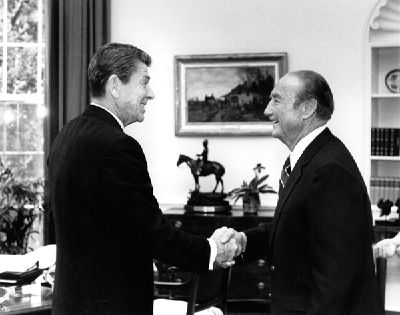
Thurmond became President Pro Tempore of the Senate in 1981, and held the largely ceremonial post for three terms, alternating with his longtime rival Robert Byrd depending on the party composition of the Senate. On December 5, 1996, Thurmond became the oldest serving member of the U.S. Senate, and on May 25, 1997, the longest serving member (41 years and 10 months). He cast his 15,000th vote in September 1998. He joined the minority of Republicans who voted for the Brady Bill.
Towards the end of Thurmond's Senate career, there was controversy over his mental condition. Some, including some close friends, claimed that he had lost mental acuity and should not have been serving in the Senate. Concern was also raised when he served as President Pro Tempore of the Senate, which is third in line for the presidency. However, his supporters argued that while he lacked physical stamina due to his age, mentally he remained aware and attentive and maintained a very active work schedule in showing up for every floor vote.
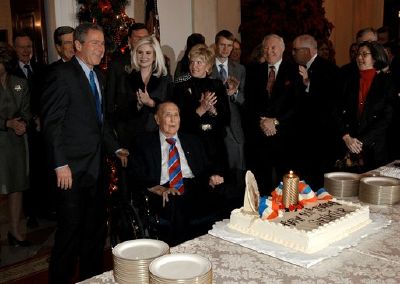
Declining to seek re-election in 2002, he was succeeded by fellow Republican Lindsey Graham. At Thurmond's hundredth birthday party in December 2002, Senate Minority Leader Trent Lott sparked controversy by praising Thurmond's 1948 candidacy for President, leading to Lott's resignation from the post. Thurmond left the Senate in January 2003 as America's longest-serving senator. On June 26, 2003, he died at 9:45 p.m at the age of 100, at a hospital in Edgefield, where he had been living since retiring.
Personal life
Marriages and children
Thurmond married his first wife, Jean Crouch (1926–1960) in 1947. She died of cancer 13 years later; there were no children.
He married his second wife, Nancy Janice Moore, Miss South Carolina of 1965, in 1968. He was 66 years old and she only 23. She had been working in his Senate office off and on since 1967. It is often said that he ran for president before she was born. This is false; however, he was old enough to be eligible. They separated in 1991, but never divorced.
At age 68, Thurmond fathered what was believed to be his first legitimate child. His four children with Nancy are: Nancy Moore (1971–1993), who was killed in a traffic accident; James Strom Thurmond Jr. (1972– ); Juliana Gertrude (1974– ); and Paul Reynolds (1976– ), elected to the Charleston County Council in 2006.
He became a grandfather publicly for the first time on June 17, 2003, just nine days before his death. He first became a grandfather secretly decades earlier when Ms. Washington-Williams had her first child.
Illegitimate daughter
Shortly after Thurmond's death on June 26, 2003, Essie Mae Washington-Williams publicly revealed that she was Strom Thurmond's illegitimate daughter. She was born to an African American maid, Carrie "Tunch" Butler (1909–1947), on October 12, 1925, when Butler was 16 and Thurmond was 22. Thurmond met Washington-Williams when she was 16. He helped pay her way through college and later paid her sums of money in cash or, through a nephew, checks. These payments extended well into her adult life.[5] Washington-Williams stated that she did not reveal she was Thurmond's daughter during his lifetime because it "wasn't to the advantage of either one of us"[5] and that she kept silent out of love and respect for her father.[6] She denies that there was an agreement between the two to keep her connection to Thurmond silent.[5]
After Washington-Williams came forward, the Thurmond family publicly acknowledged her parentage. Many close friends and staff members had long suspected this to have been the case, stating that Thurmond had always taken a great amount of interest in Washington-Williams and that she was granted a degree of access to the Senator more appropriate to a family member than to a member of the public.
Other relationships
Thurmond was known for numerous other relationships. For example, he had an affair with schoolteacher Sue Logue while he was a superintendent. She campaigned for him when he ran for this office. Logue later became the first woman executed by the South Carolina electric chair for a conspiracy to murder her husband. Thurmond was at this time a judge, but, because he was enlisted in the army, he didn't preside over her trial.[7]
In Thurmond biography Old Strom, written by Jack Bass and Marilyn Thompson, is cited a story when almost 60-year old Senator proposed daughter of then-President (and his former Senate colleague) Lyndon B. Johnson, Lynda, to go bike riding with him in the Washington suburbs. However, Johnson prohibited his daughter (who was in her 20s) from meeting Thurmond, for the "only time in her dating life."[7]
Political timeline
- Governor of South Carolina (1947–1951)
- States Rights Democratic presidential candidate (1948)
- Eight-term Senator from South Carolina (December 1954–April 1956 and November 1956–January 2003)
- Democrat (1954–April 1956 and November 1956–September 1964)
- Republican (September 1964–January 2003)
- President pro tempore (1981–1987; 1995–January 3, 2001; January 20, 2001–June 6, 2001)
- Set record for the longest Congressional filibuster (1957)
- Set record for oldest serving member at 94 years (1997)
- Set the then-record for longest tenure in the Senate at 43 years (1997), surpassed by Robert Byrd in 2006
- Became the only senator ever to serve at the age of 100
Legacy
Thurmond was a segregationist who served as a South Carolina governor and a senator and ran for president in 1968 under a banner that exposed his racial viewpoints, the States Rights Democratic Party. He was the oldest serving U.S. Senator when he retired at the age of 100, but Senator Robert C. Byrd later broke his record. He is the longest serving senator ever and holds the record for the longest filibuster ever by a U.S. Senator, which was conducted in an attempt to thwart the passage of Civil Rights Act of 1957. He was a segregationist throughout his life, though moderated his position on race in his later years by defending his early segregationist campaigns on the basis of the doctrine of states' rights. During his political career he was a member of both the Democratic and Republican parties.
Awards and Honors
- In 1989, he was presented with the Presidential Citizens Medal by President Ronald Reagan
- In 1993, he was presented with the Presidential Medal of Freedom by President George H. W. Bush
- A reservoir on the Georgia–South Carolina border is named after him: Lake Strom Thurmond.
- The University of South Carolina is home to the Strom Thurmond Fitness Center, the largest fitness complex on any college campus.
- Charleston Southern University has a Strom Thurmond Building, which houses the school's business offices, bookstore, and post office.
- Thurmond Building at Winthrop University is named for him. He served on Winthrop's Board of Trustees from 1936–1938 and again from 1947–1951 when he was governor of South Carolina.
- A statue of Strom Thurmond is located on the grounds of the South Carolina State Capitol as a memorial to his service to the state.
- Strom Thurmond High School is located in his hometown of Edgefield, South Carolina.
- The Rev. Al Sharpton was reported on February 24, 2007 to be a descendant of slaves owned by the Thurmond family. Sharpton has asked for a DNA test.[8]
- The U.S. Air Force has a C-17 Globemaster named "The Spirit of Strom Thurmond."
- The Strom Thurmond Institute is located on the campus of Clemson University. George H. W. Bush was on hand at the ground breaking ceremony while he was the Vice President.
Notes
- ↑ Robert Byrd to Become Longest-Serving Senator in History Fox News, January 13, 2015. Retrieved December 1, 2022.
- ↑ 2.0 2.1 Timothy Noah, The Legend of Strom's Remorse: a Washington Lie is Laid to Rest Slate, December 16, 2002. Retrieved December 1, 2022.
- ↑ 3.0 3.1 Timothy Noah, What About Byrd?: Unlike Thurmond He Renounced His Racist Past Slate, December 18, 2002. Retrieved December 1, 2022.
- ↑ Robert Caro, Master of the Senate: The Years of Lyndon Johnson (New York: Knopf, 2002, ISBN 0394528360).
- ↑ 5.0 5.1 5.2 Essie Mae Williams, interview by Dan Rather, 60 Minutes, December 17, 2003. Retrieved December 1, 2022.
- ↑ Thurmond's Family 'Acknowledges' Black Woman's Claim as Daughter Fox News, January 13, 2015. Retrieved December 1, 2022.
- ↑ 7.0 7.1 Jeffrey St. Clair and Alexander Cockburn, Strom's Steamy Past Counterpunch, February 15, 1998. Retrieved December 1, 2022.
- ↑ Fernanda Santos, Sharpton Learns His Forebears Were Thurmonds’ Slaves The New York Times, February 26, 2007. Retrieved December 1, 2022.
References
ISBN links support NWE through referral fees
- Bass, Jack, and Marilyn W.Thompson. Strom: The Complicated Personal and Political Life of Strom Thurmond. Washington, DC: Public Affairs, 2005. ISBN 1586482971
- Caro, Robert. Master of the Senate: The Years of Lyndon Johnson. New York: Knopf, 2002. ISBN 0394528360
- Cohodas, Nadine. Strom Thurmond & the Politics of Southern Change. Macon, GA: Mercer University Press, 1994. ISBN 0865544468
- Frederickson, Kari. The Dixiecrat Revolt and the End of the Solid South, 1932–1968. Chapel Hill: University of North Carolina Press, 2001. ISBN 0807849103
- Kalman, Laura. Abe Fortas: A Biography. New Haven, CT: Yale University Press, 1990. ISBN 978-0300046694
- Thompson, Marilyn W. Ol' Strom: An Unauthorized Biography of Strom Thurmond. Columbia: University of South Carolina Press, 2003. ISBN 1570035148
- Thurmond, Strom. The Faith We Have Not Kept. Viewpoint Books, 1968. ASIN B00005VV77
- Washington-Williams, Essie Mae, and William Stadiem. Dear Senator: A Memoir by the Daughter of Strom Thurmond. New York: Harper and brothers, 2005. ISBN 0060760958
External links
All links retrieved December 1, 2022.
- The Strom Thurmond Institute at Clemson University
- SCIway Biography of Strom Thurmond
- Strom Thurmond's family confirms paternity claim, By David Mattingly, CNN.com, December 15, 2003.
- Findagrave memorial
| Preceded by: Ransome Judson Williams |
Governor of South Carolina 1947–1951 |
Succeeded by: James F. Byrnes |
| Preceded by: None |
Dixiecrat Presidential Candidate 1948 (3rd) |
Succeeded by: None |
| Preceded by: Charles E. Daniel |
United States Senator (Class 2) from South Carolina December 24, 1954–April 4, 1956 |
Succeeded by: Thomas A. Wofford |
| Preceded by: Thomas A. Wofford |
United States Senator (Class 2) from South Carolina November 7, 1956–January 32003 |
Succeeded by: Lindsey Graham |
| Preceded by: Warren Magnuson Washington |
President pro tempore of the United States Senate 1981–1987 |
Succeeded by: John C. Stennis Mississippi |
| Preceded by: Ted Kennedy Massachusetts |
Chairman of the Senate Judiciary Committee 1981–1987 |
Succeeded by: Joe Biden Delaware |
| Preceded by: John C. Stennis Mississippi |
Dean of the United States Senate January 3, 1989–January 3, 2003 |
Succeeded by: Robert Byrd West Virginia |
| Preceded by: Sam Nunn Georgia |
Chairman of the Senate Armed Services Committee 1995–1999 |
Succeeded by: John Warner Virginia |
| Preceded by: Robert Byrd West Virginia |
President pro tempore of the United States Senate January 3, 1995–January 3, 2001 |
Succeeded by: Robert Byrd West Virginia |
| President pro tempore of the United States Senate January 20, 2001–June 6, 2001 |
||
| New Title | President pro tempore emeritus of the United States Senate June 6, 2001–January 3, 2003 |
|
| Preceded by: Jennings Randolph |
Oldest living U.S. Senator May 8, 1998–June 26, 2003 |
Succeeded by: Hiram Fong |
| Preceded by: Jimmie Davis |
Oldest living U.S. governor 2000–2003 |
Succeeded by: Luis A. Ferré |
| Preceded by: Charles Poletti |
Earliest serving US governor 2002–2003 |
Succeeded by: Sid McMath |
Credits
New World Encyclopedia writers and editors rewrote and completed the Wikipedia article in accordance with New World Encyclopedia standards. This article abides by terms of the Creative Commons CC-by-sa 3.0 License (CC-by-sa), which may be used and disseminated with proper attribution. Credit is due under the terms of this license that can reference both the New World Encyclopedia contributors and the selfless volunteer contributors of the Wikimedia Foundation. To cite this article click here for a list of acceptable citing formats.The history of earlier contributions by wikipedians is accessible to researchers here:
The history of this article since it was imported to New World Encyclopedia:
Note: Some restrictions may apply to use of individual images which are separately licensed.
↧ Download as ZWI file | Last modified: 02/04/2023 04:25:56 | 11 views
☰ Source: https://www.newworldencyclopedia.org/entry/Strom_Thurmond | License: CC BY-SA 3.0
 ZWI signed:
ZWI signed: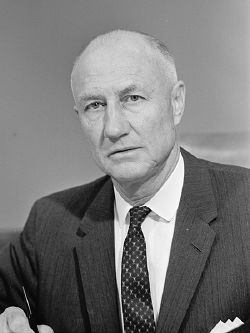
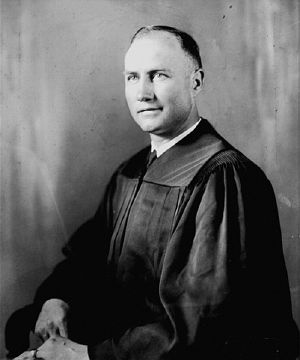
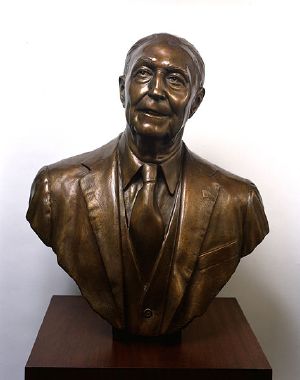

 KSF
KSF